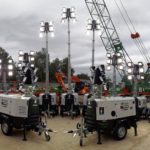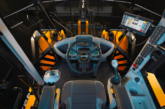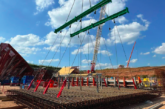BAM Nuttall, the UK based supplier of civil engineering services, has invested in a further thirty lighting towers from the Cambridgeshire manufacturer and supplier, Trime (UK) Limited.
The company now has over eighty Trime made lighting sets in their rental fleet.
This latest order comprised of twenty engine powered X-ECO LED units alongside ten X-HYBRID sets. This is the first time BAM Nuttall has opted for the Trime battery/diesel driven lighting towers.
BAM Nuttall’s Plant Manager, Andy Haythorne said, “The Trime X-ECO LED units have proven very popular with our customers. However, we have set ourselves some very stringent targets relating to lowering our carbon output, hence this first purchase of Trime X-HYBRID sets.”
“Looking through the data supplied by Trime, we believe that the X-HYBRID will go a long way towards us meeting with our carbon reduction objectives,” added Andy.
The sourcing of more efficient plant and equipment remains a key part of the BAM Sustainability Strategy as they work towards challenging 2020 targets for carbon reduction.
As the name suggests, the Trime X-HYBRID lighting units are powered through an individually designed hybrid power supply system. This comprises of a series of rechargeable batteries backed-up by a small diesel engine. The combined system provides for fuel savings of up to 90% with corresponding reduction of CO2 emissions. The Trime X-HYBRID can run silently for up 1800 hours making them ideally suited for night working and in urban environments. The batteries are recharged in around eight to nine hours and diesel consumption can be as little as 0.17 litres per hour.
In 2016, BAM Group UK (legal entity comprising of BAM Nuttall and BAM Construct UK) were awarded the CEMARS gold standard for achieving significant carbon savings year-on-year over a six-year period by following a systematic carbon reduction programme that have resulted in a reduction in emissions of 17.72% when compared with baseline data. CEMARS is the Carbon Emissions Measurement and Reduction Scheme and refers to ISO14064-1:2006. For 2017 and beyond BAM Nuttall has set even more challenging targets to reduce its energy consumption by a further 25% on a new 2015 baseline, and across its Scope 1, 2 & 3 emission classes by 2020. This target is in line with that of the parent company Royal BAM Group and works towards a climate positive future in the long term – a future in which construction is not a carbon emitter but one in which it is a carbon eliminator.









